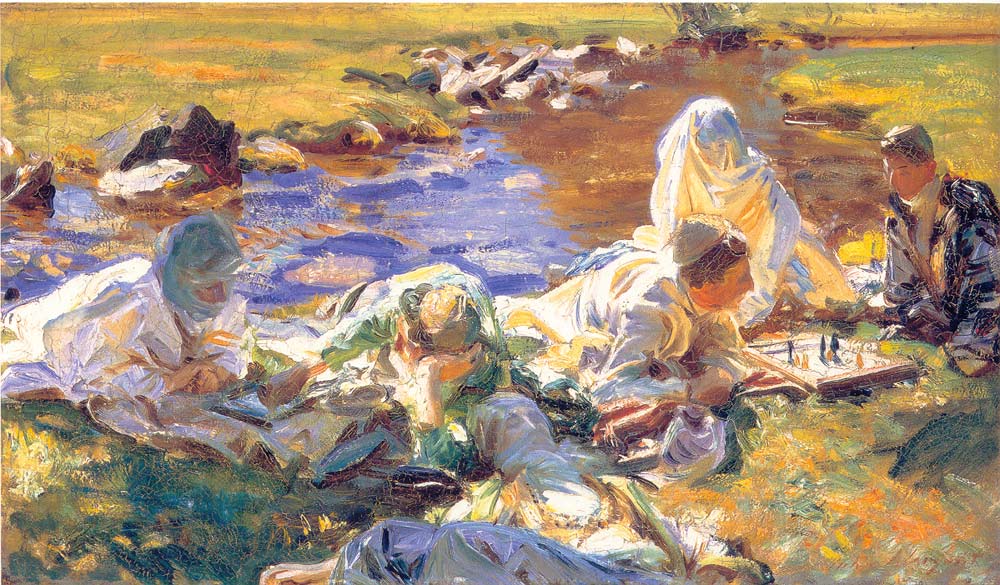|
Dolce
Far Niente
John
Singer
Sargent
-- American painter
c. 1907
The
Brooklyn Museum of Art, New York
Oil on
canvas
41.4 x
71.9
cm (16 5/16
x28 x 5/16 in.)
Bequest
of A
Augustus
Healy
Jpg: local
From: Patricia Duggleby
p du gg leby@accesscomm.ca
Date: Oct 2, 2005
My great-grandmother, Margaret O'Regan [later Margaret Beaton], was a
companion to John Singer
Sargent's mother in London for the year before she died. After Mrs.
Sargent died, she stayed on as companion to Emily. She remembered
modelling for Sargent . . . in a newspaper
article from 1966 (when Gram was 90).
(Editor's Note
- Patricia and I believe that Dolce Far Niente is one of the paintings
she modeled for. If her arms hurt during the posing maybe she was the
far left figure)
 |
Calgary Herald
Calgary 90-Year-Old
Modelled For Sargent
By
Edythe Humphrey
1966
Herald
Staff Writer
She modelled for noted portrait painter John Singer Sargent. At another
period in her life, she was a butler.
Those are two of the reasons Mrs. Margaret Beaton 90-year-old resident
of Kenwood Nursing Home, 1512 8th Ave, N.W,, says she is reluctant to
talk of her experiences for “they seem more like fiction than fact.”
Born Margaret O’Regan at Castletown Roach in County Cork, Ireland on
October 6, 1875, she had no liking for school lessons and left home
while still in her teens, she told The Herald.
“My cousin Edith and I looked for work in London but because of my poor
education, there was little I could do to earn a living but menial
work.”
* * *
One of her jobs, with a Harley Street doctor, had developed to the
“verge of hospital training as a nurse” when she committed a grave
error.
“I use to sterilize the doctor’s instruments, but one day while they
were steaming, I went downstairs to a shop below to look at some hats.
The instruments burned and I was fired on the spot,” she explained.
Her most interesting experiences occurred during the two years she was
companion to Mrs. Fitzwilliam Sargent, the artist’s mother, and his
sister, Emily, shortly after the turn of the century.
“I lived with Mrs. Sargent at No. 10, Chaney Walk in Chelsea, but his
mother was 80 and died shortly after I joined her. Mr. Sargent asked if
I would stay on with his sister, who was a hunchback,” Mrs. Beaton said.
* * *
While she was with the Sargents, she posed as a “Turkish lady” for the
famous artist, wearing “all kinds of veils so only my eyes showed.”
But it wasn’t as easy as it looked, she said because a sitting lasted
about two hours “and my arms were swollen from not moving by the time a
session ended.”
On another occasion, she accompanied Emily and John Sargent, neither of
whom ever married, and the valet to Mont Blanc in the Italian Alps.
The trip was “by caravan with overnight stops at inns and for changing
horses.”
It was in this visit that Margaret O’Regan posed for Italian artist,
poet and writer Senor Stratta.
For his painting of the Falling of the Holy Women, now “hung in an
Italian church” she said he used her head and hair coloring. At that
time she had curly auburn hair and hazel eyes.
* * *
Mrs.
Beaton still remembers the
subjects of many of John Singer Sargent’s paintings, including the two
girls in his first exhibited study of children entitled Carnation,
Lily, Lily, Rose.
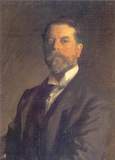
Self-Portrait
1906 |

|
“Because
he was shy, I never let on he had an audience, but I often
watched him painting and I can still see him doing his own portrait
among the trees at Mont Blanc," she said.
When John and Emily Sargent went on to Rome to visit friends, Margaret
O’Regan returned to England.
She became butler to a Major Lee, and he hired her, he explained,
because all the male butlers drank his liquor.
As a uniform, she wore a tailored black dress with bow tie, stiff white
collar and cuffs.
* * *
Lonely for her cousin Edith who had gone to Canada, adventurous
Margaret accepted her invitation to the new land.
She was met at Swan River, Man with an ox team, by her cousin.
“I began to wonder what kind of place this was, but it soon proved
great fun,” she said, though a far cry from the excitement of London.
Once more, her path came close to crossing that of Sargents when,
shortly before John died in 1925, he and Emily visited Banff
By this time, Margaret O’Regan had become Mrs. Neil Beaton, and “having
learned everything from a bull to a cow” she was living “a full and
interesting life” at Symon’s Valley.
In those days, mails came late and in bunches, so it was not until the
Sargents had returned to England that she learned of their visit.
Of all her experiences from girlhood to 90, it was the days with the
Sargent family that will continue to evoke her most vivid memories, she
said.
|
(Calgary Herald) |
From: Patricia Duggleby
p du gg leby@accesscomm.ca
Date: Oct 2, 2005
... I
have tried to determine which painting she posed for. There is "Turkish Lady", which may have been "Turkish
Woman by a Stream",
but that model is generally considered to be Polly Barnard. I came up with "Dolce Far Niente" [this one above]
or "The Chess Game",
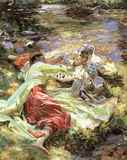
The Chess Game
1907
for
which the models have not been determined. These were painted at
the "right" time and in the "right" place.
She travelled with Emily and Sargent to Mont Blanc in 1906 but chose to
return to London rather than go on to Rome with them.
. . . And I found out why Margaret left the Sargent's employ. Seems she
had a falling out with Sargent's sister Violet, and since Gram was not
known for her reticence, I'm sure they had words. She returned to
England to become a butler, a non-traditional occupation for a woman in
1906.
I've
attached a jpeg file of the article and photo form the Calgary Herald
from 1966. I hope you can read it.
Gram also said she posed as a "Spanish Lady", but I have not been able
to find a painting.
I hope
someone can shed some light
on our little family mystery... I would like to know more about
Margaret (O'Regan) Beaton's life as an artist's model and if you have ever heard of
Margaret O'Regan, companion to Emily, or if her name has ever come up
with reference to the 1906 trip to the Italian Aps. I look forward to hearing from some of
your correspondents
Oct 5, 2005
I'm so pleased you enjoyed reading the article. She was a feisty lady,
even in old age. I've attached three photos of Margaret which
might give you a clue to the identity of the mysterious models in the
paintings. There aren't that many of her as a younger woman: she was
the wife of a rancher/farmer and money was scarce. But these might help.
Oct 17, 2005
I don't have much to add to the article and my other posts, but here
goes.
The "Spanish Lady" painting is by Carlo Stratta and it is purported to
have hung in the Tate Gallery in London, England, although I can't find
a current reference for anything by Stratta. He used Margaret's head
and hair for one of the women in the painting "Falling of the Holy
Women".
When Margaret left the Sargent's employ, she went to work for a Lord
Newton, of Sandringham, England, according to my sources. I believe
that was the same person as Major Lee: often the name of an inherited
title if different from a person's "real" name. Major Lee's nephew was
the Honourable Piers Lee, who was equerry to King George VI. Lee told
Margaret not to go to Canada, that she would live to regret it. When
King George VI toured Canada in 1939, he wanted to meet with Margaret
but she refused. She didn't want him to know how much her life had
changed and how she had "come down in the world".
Margaret emigrated to Canada about 1910: we know she ended up in
Lethbridge, Alberta, in 1911, where she worked as a waitress in one of
the local hotels. Lethbridge was a rough western town, although
not wild. After all, we had the Royal Canadian Mounted Police to keep
order! Margaret married Neil Beaton, a rancher, in 1914.
Thank you!
Pat Duggleby
Regina, Saskatchewan, Canada
(post
at forum)
Notes:
Exhibitions
Sargent
in Italy, 2002-2003
|
|

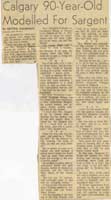
Photo of article
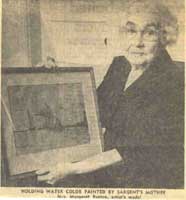
Mrs. Margaret Beaton Holding
Watercolor Painted by Sargent's Mother

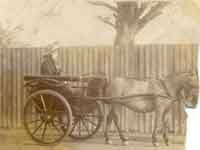
Margaret O'Regan -
Norfolk
England 1890s
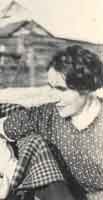
Margaret
Beaton, (nee O'Regan) -
Spring
1916
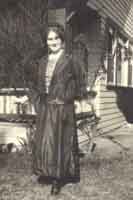
Margaret
Beaton, (nee O'Regan) -
Los
Angeles 1923
|
